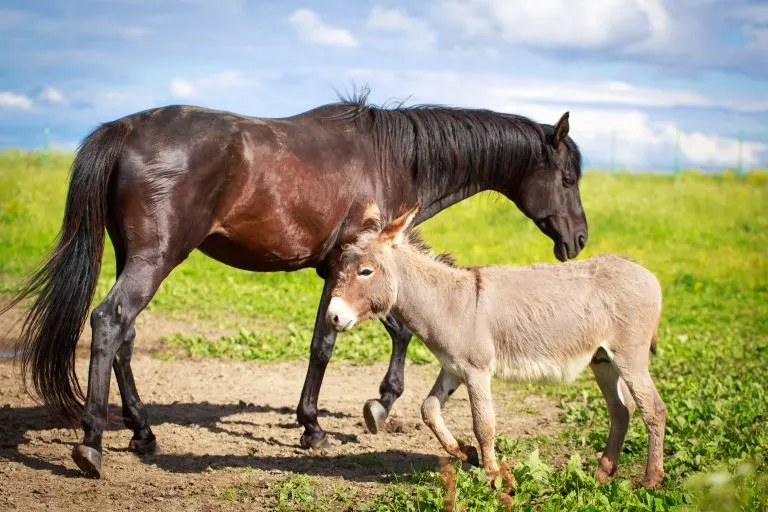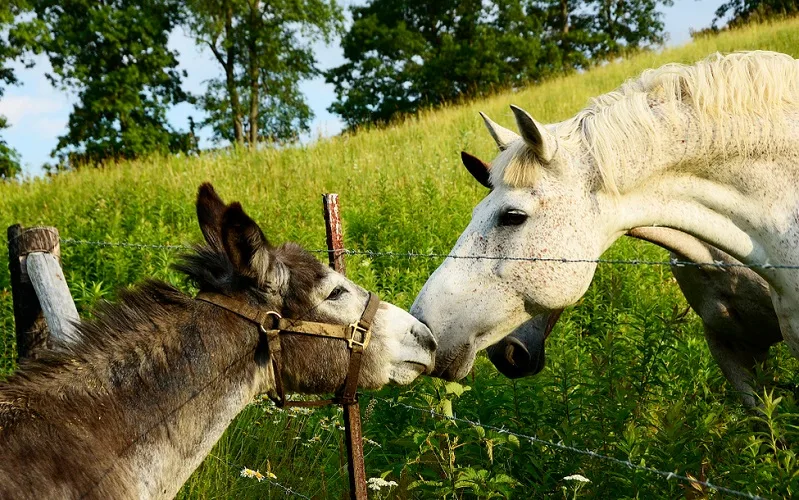
Horses and donkeys have left their hoofprints on the timeline of human civilization. They have ploughed our fields, served in our wars, and found their way into our folklore.
These remarkable creatures, despite their shared family, are distinct species with unique characteristics, behavior, and roles in the world.
The differences between horses and donkeys, ranging from physical traits to lifespan and offspring, are as fascinating as they are fundamental.
This article sets out to explore the differences between a horse and a donkey in detail, shedding light on the uniqueness of these invaluable animals.
What is the Difference Between a Horse and a Donkey?
Horses and donkeys are both members of the Equidae family, but they are different species. Horses have 64 chromosomes, while donkeys have 62. This means that they cannot produce offspring together, except in rare cases.
The offspring of a horse and a donkey is called a mule. Mules are usually sterile, meaning they cannot have their own offspring.
Physical Characteristics
Size and Build
Horses typically stand taller and have a more muscular build compared to donkeys. The average horse ranges in height from about 4.5 to 6 feet (measured at the shoulder), while donkeys are generally between 3 and 4.5 feet tall.
Furthermore, horses typically weigh between 900 and 2,200 pounds, while an average donkey usually weighs between 400 and 1,100 pounds, depending on the breed.

Coat, Mane, and Tail
Horses have short, smooth coats that can come in various colors and patterns. They also possess a long, flowing mane and a tail made of long, silky hair known as ‘feathers’.
Conversely, donkeys have a coarse coat, typically gray or brown, and their mane and tail differ significantly. The mane is stiff and upright, often cut short, and the tail resembles that of a cow, with a tuft of hair at the end.
Hooves and Ears
Horse hooves are generally larger and rounder compared to the smaller, more oval-shaped hooves of the donkey. This difference reflects their adaptation to different habitats: horses evolved for running fast on soft grasslands, whereas donkeys, adapted to harsh desert environments, have tougher hooves that are less prone to injury.
Additionally, donkeys are known for their large, expressive ears, which are much longer than a horse and help dissipate heat.
Behavioral Differences
Temperament
Horses, bred for work and transportation, often showcase a cooperative temperament. They have been trained for millennia to accept riders and harnesses.
Donkeys, however, show a more independent streak. They are cautious animals, often perceived as stubborn because they won’t put themselves in dangerous situations without careful consideration.
Communication
When it comes to vocalizations, horses neigh or whinny, while donkeys produce a distinct braying sound. Donkeys also have a unique communication method called ‘the freeze’, where they stand very still to assess a potential threat – a trait that often leads to misconceptions about their ‘stubbornness’.

Lifespan and Health
Generally, donkeys enjoy a longer lifespan compared to horses. While the average life expectancy of a horse is around 25-30 years, donkeys often live to 30-50 years, and some even surpass that range.
Additionally, donkeys are less prone to certain diseases like laminitis and colic that frequently affect horses.
This difference could be attributed to their evolution in harsh environments where food was scarce, which led them to develop more efficient digestion.
Horse and Donkey Offspring
Another significant difference between horses and donkeys is the offspring they produce. A male donkey (jack) and a female horse (mare) produce a mule, while a male horse (stallion) and a female donkey (jenny) produce a hinny.
Both mules and hinnies are typically sterile due to the different number of chromosomes horses and donkeys have.

Because horses have 64 chromosomes and donkeys have 62, this results offspring that usually cannot reproduce.
Common FAQs About Horses and Donkeys
Why are Donkeys Considered ‘Stubborn’?
Donkeys have a natural cautiousness and are unlikely to put themselves in potentially dangerous situations without careful consideration. This behavior can often be misinterpreted as stubbornness.
Are Horses Faster Than Donkeys?
Yes, due to their larger size and muscular build, horses are generally faster than donkeys.
Can Horses and Donkeys Eat the Same Foods?
Both horses and donkeys are herbivores, so they eat similar diets. However, donkeys evolved in harsh environments with scarce food and have more efficient digestion. They tend to gain weight easily, so their diet needs careful management to avoid obesity.
Do Donkeys Require the Same Care as Horses?
While they share some similar care requirements, such as needing regular hoof care and dental check-ups, donkeys have unique needs.
For example, they have a dense fur coat which provides excellent insulation, but this means they can overheat in hot weather and may require shade and water to cool down.
Are Horses More Intelligent Than Donkeys?
Intelligence is difficult to compare directly. Horses are known for their ability to be trained for a variety of tasks and their cooperative nature.
Donkeys, on the other hand, are praised for their problem-solving skills and independent thinking. It’s fair to say both species have their own types of intelligence.





